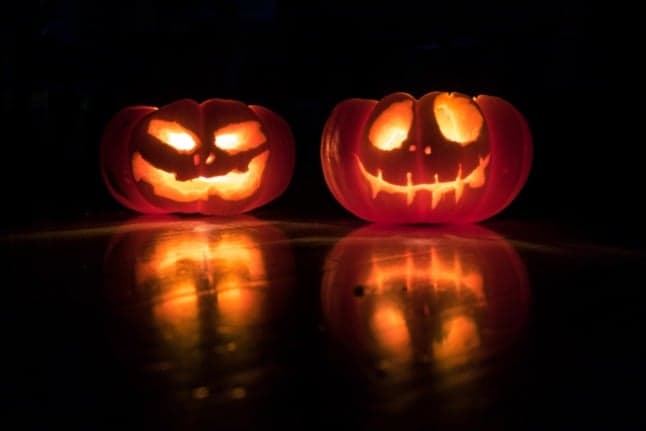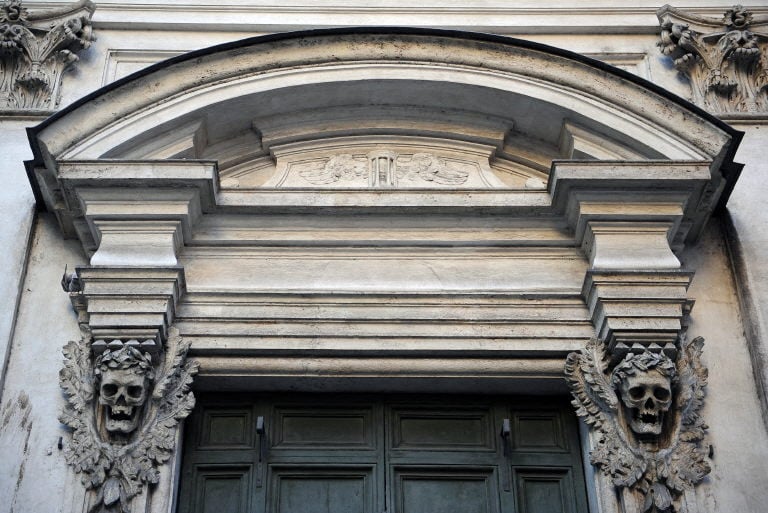How does Italy celebrate Halloween?

Visitors from countries such as the UK and USA might be expecting to see the shops full of pumpkins, ghost costumes and mini candy, but in Italy things are a little more restrained around Halloween.
While Halloween is less of a big deal in Italy that it is in some other countries, that's not to say it isn't celebrated at all.
Its popularity has increased in recent years, even if a large proportion of the population criticises the holiday for being an American import or not fitting with the country's strong Catholic beliefs.
According to recent surveys, one in three Italians think Halloween is just a "commercial gimmick", while a quarter of those surveyed say the event is not connected to Italian tradition and culture.
Younger Italians under the age of 45 are more likely to embrace the holiday, surveys found.
Still, Italian supermarkets usually start to stock a few ready-made decorations by mid-October, and perhaps some specially-themed candy and sweets.
Trick or treat
Unsurprisingly, Italian children have taken to the idea of roaming their neighbourhood in creepy costumes demanding sugary treats.
So while it's not as ubiquitous as it is in the USA, you may find you get a few mini ghouls or witches knocking on your door come October 31st, shouting "dolcetto o scherzetto!“ (trick or treat).
Readers tell us they've found the holiday here is mainly seen as an event for young children, with shops giving out sweets and villages putting up kid-friendly displays in the piazza for the occasion.
Italian supermarkets are full of pumpkins at this time of year - though the majority of Italians are buying them to cook, not carve.
READ ALSO: Pumpkin risotto and the great wardrobe switch: How life in Italy changes when autumn arrives
One place you may find more raucous halloween parties is the city of Florence, where the city centre has a sizeable proportion of American and other international residents.
But for Italians, more adult celebrations mainly involve halloween-themed dinners. Restaurants across the country are increasingly putting on special Halloween dinner menus - which are more about seasonal produce than anything spooky.
Some customers might dress up a little, but you won't see many going all out with fake blood and gore.
One exception to all this is the Fucacoste and Cocce Priatorje or 'bonfire and heads of purgatory' - a bonfire, feast, and pumpkin-carving competition held on November 1st in Orsara di Puglia, in the southern region of Puglia.
This event, which looks more than a little similar to the western-style Halloween celebrations we're familiar with, is centuries old and many say it is connected to the true origins of Halloween.
And at some of southern Italy's more macabre-looking churches and cemeteries, to outsiders it feels like Halloween all year round: carved stone skulls decorate the exterior, and embalmed hearts, vials of what is purported to be blood, and the mummified remains of monks are on display inside - see Rome's Santa Maria dell'Orazione e delle Morte church, or the Capuccini cemetary in Palermo, for example.

The Santa Maria dell'Orazione e delle Morte church in Rome. (Photo by ALBERTO PIZZOLI / AFP)
Public holidays
The good news is that Italians do celebrate the season in much more practical way - by having a day off work.
November 1st, All Saints Day, known as ognissanti or tutti i santi in Italian, is an official bank holiday.
There are absolutely no spooky goings-on, though.
In the south of Italy, where onomastici or saints' name days are observed, November 1st is everyone's name day at once, and so you're supposed to say auguri (congratulations or best wishes) to everyone you meet. Many families mark the day with – what else? - a big lunch.
As in many Christian countries, November 2nd is when Italians mark their own All Souls' Day, or Festa dei Morti, the 'Day of the Dead'.
The festival of the dead on October 31st, which has Celtic roots, was celebrated in some parts of Italy long ago. But in 1000 A.D. the Catholic Church created All Souls' Day on November 2nd in an attempt to replace the Celtic festival with a similar. but church-approved, tradition.
Although the date and name was changed, plenty of fascinating old traditions stuck in various parts of the country.
But there's no day off work, and this isn't a chance to don a scary costume, either.
Instead, it's a much calmer day of remembrance, mainly celebrated with prayers, flowers and, of course, food.
Comments (2)
See Also
While Halloween is less of a big deal in Italy that it is in some other countries, that's not to say it isn't celebrated at all.
Its popularity has increased in recent years, even if a large proportion of the population criticises the holiday for being an American import or not fitting with the country's strong Catholic beliefs.
According to recent surveys, one in three Italians think Halloween is just a "commercial gimmick", while a quarter of those surveyed say the event is not connected to Italian tradition and culture.
Younger Italians under the age of 45 are more likely to embrace the holiday, surveys found.
Still, Italian supermarkets usually start to stock a few ready-made decorations by mid-October, and perhaps some specially-themed candy and sweets.
Trick or treat
Unsurprisingly, Italian children have taken to the idea of roaming their neighbourhood in creepy costumes demanding sugary treats.
So while it's not as ubiquitous as it is in the USA, you may find you get a few mini ghouls or witches knocking on your door come October 31st, shouting "dolcetto o scherzetto!“ (trick or treat).
Readers tell us they've found the holiday here is mainly seen as an event for young children, with shops giving out sweets and villages putting up kid-friendly displays in the piazza for the occasion.
Italian supermarkets are full of pumpkins at this time of year - though the majority of Italians are buying them to cook, not carve.
READ ALSO: Pumpkin risotto and the great wardrobe switch: How life in Italy changes when autumn arrives
One place you may find more raucous halloween parties is the city of Florence, where the city centre has a sizeable proportion of American and other international residents.
But for Italians, more adult celebrations mainly involve halloween-themed dinners. Restaurants across the country are increasingly putting on special Halloween dinner menus - which are more about seasonal produce than anything spooky.
Some customers might dress up a little, but you won't see many going all out with fake blood and gore.
One exception to all this is the Fucacoste and Cocce Priatorje or 'bonfire and heads of purgatory' - a bonfire, feast, and pumpkin-carving competition held on November 1st in Orsara di Puglia, in the southern region of Puglia.
This event, which looks more than a little similar to the western-style Halloween celebrations we're familiar with, is centuries old and many say it is connected to the true origins of Halloween.
And at some of southern Italy's more macabre-looking churches and cemeteries, to outsiders it feels like Halloween all year round: carved stone skulls decorate the exterior, and embalmed hearts, vials of what is purported to be blood, and the mummified remains of monks are on display inside - see Rome's Santa Maria dell'Orazione e delle Morte church, or the Capuccini cemetary in Palermo, for example.

Public holidays
The good news is that Italians do celebrate the season in much more practical way - by having a day off work.
November 1st, All Saints Day, known as ognissanti or tutti i santi in Italian, is an official bank holiday.
There are absolutely no spooky goings-on, though.
In the south of Italy, where onomastici or saints' name days are observed, November 1st is everyone's name day at once, and so you're supposed to say auguri (congratulations or best wishes) to everyone you meet. Many families mark the day with – what else? - a big lunch.
As in many Christian countries, November 2nd is when Italians mark their own All Souls' Day, or Festa dei Morti, the 'Day of the Dead'.
The festival of the dead on October 31st, which has Celtic roots, was celebrated in some parts of Italy long ago. But in 1000 A.D. the Catholic Church created All Souls' Day on November 2nd in an attempt to replace the Celtic festival with a similar. but church-approved, tradition.
Although the date and name was changed, plenty of fascinating old traditions stuck in various parts of the country.
But there's no day off work, and this isn't a chance to don a scary costume, either.
Instead, it's a much calmer day of remembrance, mainly celebrated with prayers, flowers and, of course, food.
Join the conversation in our comments section below. Share your own views and experience and if you have a question or suggestion for our journalists then email us at [email protected].
Please keep comments civil, constructive and on topic – and make sure to read our terms of use before getting involved.
Please log in here to leave a comment.